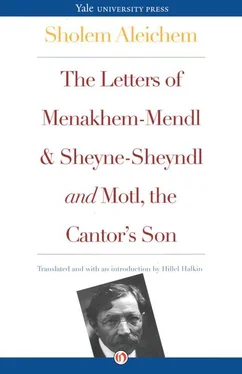It’s time to move on. Elye acts as though it’s the end of the world. My mother tries to cheer him. “Don’t be foolish,” she says. “Would you be happier if they had taken all our money in the forest and slaughtered us in the bargain?” Pinye says she’s right. A Jew, he says, should see the bright side. Brokheh sticks her nose in and says, “I’ve always said Elye was an old maid.”
We have to make plans. How do we get to America? Everyone suggests something else. One person says via Paris. Another says London. A third tells us Antwerp is closer. We can’t make up our minds. My mother is scared of Paris because it’s so big. Brokheh doesn’t like the sound of Antwerp. Who ever heard of a city named for ants? That leaves London. Pinye thinks it’s our best bet. He’s read in a book called “The Atlas” that London is quite a place. It’s the hometown of Moses Montefiore and Rothschild.
“Rothschild? He’s from Paris!”
So says my brother Elye. The one thing he and Pinye agree on is that they always disagree. If Pinye thinks it’s daytime, Elye is sure it’s the middle of the night. They don’t exactly quarrel. It’s more like boxing. They can go at it for hours if no one stops them.
Once they had it out over the German word for horseradish. In Kasrilevke we said khreyn, but did the Germans say khron or khran? They went at it hammer and tongs until they decided to buy some horseradish in the market and show it to our innkeeper. “Hey there, Mr. Germany,” they said, “we’d like to ask you something. Tell us the truth: this here fruit — do you call it a khron or a khran? ” “You’re talking Jewish,” answered the innkeeper. “In German it’s a Meer-rettich. ”
Did you ever hear such a crazy word in all your life? He’ll do anything to annoy us, that innkeeper. He makes everything sound like something else. He calls a hair a har, which means a gentleman, and a gentleman a her, which means “Over here!” And how does he say “over here”? Hier-hier! And you wonder why we call the Germans cabbageheads?
You’ll have to excuse me for going on about the Germans and their language and forgetting all about America. America, it seems, is still a ways off. First we have to get to London. And before that, there’s Lemberg. In Lemberg, we’re told, there’s something called an Emigration Committee. We’re hoping it can help us. Why shouldn’t it when it’s helped others — and especially after all we’ve been through, what with losing all our bundles and linens and all? My mother is planning what to say to it. “Just don’t cry!” Elye tells her. “Think of your eyes! Don’t you want to get to America?”
That’s what he says, Elye, and goes off to pay our bill. A minute later he comes back pale as a ghost. What’s wrong? The bill has thrown him completely. There’s nothing that isn’t on it. The six Sabbath candles we lit — six groschen. The havdalah candle to end the Sabbath — four groschen. “What havdalah candle?” Elye asks. “The one you heard me say the blessing over,” says the innkeeper. “But why four groschen?” Elye asks. “If you’d rather make it five, let’s make it five,” says the innkeeper. Next comes something called his “commission.” What kind of bad news is a commission? It’s his fee, he says, for coming with us to buy clothes.
Brokheh hears that and gives her hands a clap. “Mother-in-law! What did I tell you? These Germans are worse than the robbers in the forest! Your biggest Russian pogromchik is a saint compared to them. You say the name of this place is Brody? I tell you it’s Sodom!”
Being compared to a Russian pogromchik didn’t faze that German as much as hearing Brody called Sodom. Did he fly off the handle! The Russians, he said, had the right idea. If you asked him, there should be more pogroms. If he were the Kaiser of Russia, he would slaughter every one of us.
I’ve told you our friend Pinye has a temper. He can be pretty peaceful until it explodes, but just say a wrong word to him then and you’re taking your life in your hands. He drew himself up to his full height, Pinye did, went over to that innkeeper, and shouted right in his face:
“Go to hell, you stinking kraut! And your father, too!”
The kraut made Pinye pay for that. He gave him two such juicy slaps in the face that the sparks flew. What followed was grand. All Brody came running. It was Jew against Jew, a real slugfest. Do I love it when the fur begins to fly!
We took off for Lemberg that same day.
Lemberg, mind you, is nothing like Brody. First, there’s the town itself. It’s clean, airy, pretty — a sight for sore eyes. I won’t say it doesn’t have streets like Brody’s in which you have to hold your nose and wear galoshes even in good weather. But it does have a park in the center of it where everyone goes walking, even the goats. On Saturdays the Jews promenade in their fur hats and no one says a word. It’s a free country. And the people! Pure gold!
My mother says Lemberg and Brody are like day and night. Elye says he wishes we had come to Lemberg first. Pinye says that’s illogical, since Lemberg is only better than Brody because it’s further from the border and nearer to America. “You call that logic?” Elye says. “Show me Lemberg on the map and show me America!” When it comes to maps, Pinye says, he’s studied geography and can teach Elye a thing or two. “Then why don’t you tell me where the Committee is,” Elye says. “What Committee?” “The Emigration Committee!” “What does that have to do with geography?” “A big expert like you,” Elye says, “should know that too.”
So Elye says. But the more people in the street we stop to ask, the more have never heard of the Emigration Committee. A weird town!
“They know. They’re just not telling!”
That’s Brokheh’s opinion. She’s down on everything, Lemberg too. She thinks the streets here are too wide. Now isn’t that something to be ashamed of!
That’s women for you. Nothing ever suits them.
We’ve found the Committee. It’s in a tall building with a red roof. First you wait outside for a while. It’s a pretty long while. Then someone opens a door and you climb some stairs and see a lot of people at the top of them. Most are emigrants from Russia like us. Many look hungry and have babies. The ones without babies look hungry too. Each day they’re told to come back the next morning. The next morning they’re told to come back the next day.
My mother has made friends with some of the women. Many have had bad luck too. They tell each other about it and feel luckier. Some have been through pogroms. That’s horrible to hear about. Everyone is going to America and no one has a way of getting there. Some folks have been sent back to Russia. Some have found work in Lemberg. Some have been sent on to Cracow. Where is the Committee? You’re at it. Who is the Committee? May you know as much sorrow in your life as anyone knows that!
A tall man with a pockmarked face and kind, smiling eyes appears.
“He’s from the Committee! He’s a doctor.”
The doctor pulls up a stool. Every few minutes a new emigrant steps up to him with some new problem. The doctor listens and says he’s only one person. He wishes he could help. “On a Committee of thirty members,” he says, “I’m the only one who ever shows up. What can I do all by myself?”
The emigrants don’t want to hear that. How long can they go on like this? They’ve used up all their money. Either give them tickets to America, they say, or send them back to Russia.
The doctor explains that he can only send them as far as Cracow. In Cracow there’s another Committee. Maybe it can do more than this one.
Читать дальше












